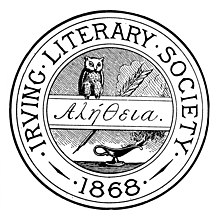The Irving Literary Society (Cornell University)

The Irving Seal, 1883
|
|
| Motto | Alethia |
|---|---|
| Formation | October 20, 1868 |
| Extinction | 1887 |
| Purpose | College literary society |
| Headquarters | Society Hall (Room 10, White Hall), Cornell University |
| Location |
|
The Irving Literary Society (also known as the Irving Literary Association or simply The Irving) was a literary society at Cornell University active from 1868 to 1887. The U.S. Bureau of Education described it as a "purely literary society" following the "traditions of the old literary societies of Eastern universities." During the period when the Cornell literary societies flourished, the Irving and its peers produced literature at a rate higher than the campus average for the next generation, leading commentators at the turn of the 20th century to question whether academic standards had fallen since the university's founding. Named after the American writer Washington Irving, the Irving Literary Society was founded on October 20, 1868, shortly after Cornell opened. Past members who went on to prominent careers included Judge Morris Lyon Buchwalter, Senator Joseph Benson Foraker, and the journalists John Andrew Rea and Francis Whiting Halsey. The Irving's last public meeting was held on May 23, 1887. After that it ceased to exist as a Cornell University student society. However, the New York Alpha Chapter of the Phi Kappa Psi undergraduate fraternity at Cornell claims to have "served as steward of the Irving Literary Society since 1888".
A preliminary meeting chaired to organize the Society was held Room No. 4, Cascadilla Place, on October 20, 1868, some thirteen days after Cornell University opened its doors. The second business meeting followed on November 7 with George F. Behringer as President when the society's name was discussed with members equally between the John Bright Brotherhood, honoring the English orator John Bright and others favoring the Irving Literary Association after Washington Irving. A compromise was struck in which the society was named after Irving, while Bright and the American orator, Charles Sumner, were admitted as the first honorary members. Each of the early sessions was opened with prayer. In 1930 John Andrew Rea recalled:
...
Wikipedia
